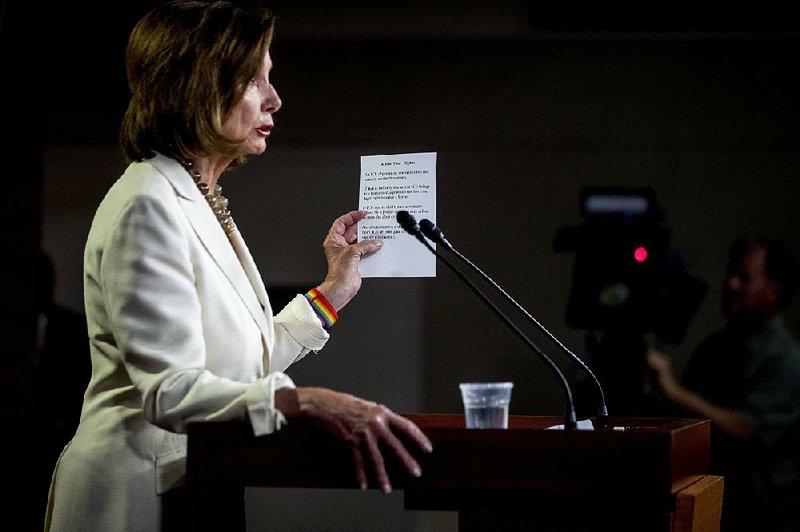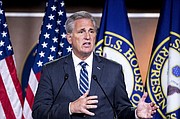CHICAGO -- A nationwide migration enforcement operation targeting people who are in the United States illegally is expected to begin as early as this weekend after it was postponed last month by President Donald Trump, according to two administration officials and migrant activists.
The operation would target people with final deportation orders, including families whose cases were fast-tracked by judges in 10 major cities, including Chicago, Los Angeles, New York and Miami.
It has sparked anger and concern among migrant-rights advocates and lawmakers.
"Our communities have been in constant fear," Estela Vara, a Chicago-area organizer, said Thursday at a rally outside the city's Immigration and Customs Enforcement offices where some activists chanted "Immigration Not Deportation!"
The sweep remains in flux and could begin this weekend or later, according to the two administration officials, who were not authorized to discuss the matter publicly and spoke on condition of anonymity. Still, the American Civil Liberties Union pre-emptively filed a lawsuit Thursday in an attempt to protect asylum seekers.
Meanwhile, activists ramped up efforts to prepare by bolstering know-your-rights pocket guides, circulating information about hotlines and planning public demonstrations. Vigils outside detention centers and hundreds of other locations nationwide were set for today, to be followed by protests Saturday in Miami and Chicago.
The operation is similar to ones conducted regularly since 2003 that often produce hundreds of arrests. It is somewhat unusual to target families, as opposed to migrants with criminal histories, but it's not unprecedented. The administrations of Trump and President Barack Obama have targeted families in previous operations.
But this latest effort is notable because of the politics swirling around it.
Last month, the Immigration and Customs Enforcement director at the time, Mark Morgan, signaled that agents would escalate efforts to round up families. Days before the operation was to begin, Trump forecast the plan on Twitter, blindsiding immigration agents whose safety officials feared would be compromised as a result.
In early June, the Department of Homeland Security's acting secretary, Kevin McAleenan, told Morgan to call off the operation. McAleenan did not support the raids, officials said at the time, in part out of concern that parents who are in the country illegally could be separated from any of their children who are U.S. citizens.
In a meeting with White House officials June 21, two days before the raids were scheduled to begin, McAleenan again outlined the challenges of the operation, including the separation of families and the logistics of housing them until they can be removed. If parents are found to have children who are U.S. citizens, for example, immigration agents will need to wait with the children in a hotel room until a relative in the United States can claim them.
Homeland Security officials also worried that many of the families that the administration had hoped to detain might have left the addresses known to Immigration and Customs Enforcement after Trump tweeted the agency's plans.
House Speaker Nancy Pelosi, D-Calif., called Trump after his tweet and urged him to halt the operation, which in a statement hours later she described as "heartless."
Trump then tweeted that he would delay the effort at the Democrats' request. But he also threatened to resume the deportations if Democrats refused to join with Republican lawmakers to "work out a solution to the Asylum and Loophole problems at the Southern Border."
Days later, the Senate passed a $4.6 billion humanitarian-aid package for the border.
The Immigration and Customs Enforcement agency said in a statement that it would not discuss specifics about enforcement operations.
"As always, ICE prioritizes the arrest and removal of unlawfully present aliens who pose a threat to national security, public safety and border security," according to the statement.
Trump started hinting anew in recent days that more removals were coming. He said last weekend that they would be starting "fairly soon."
"Well, I don't call them raids," he said. "I say they came in illegally and we're bringing them out legally."
Ken Cuccinelli, the new head of Citizenship and Immigration Services, told CNN on Wednesday that the raids were "absolutely going to happen."
Pelosi said she hoped the administration would reconsider. "Families belong together," she said.
The administration has been straining to manage a border crisis, and some officials believe deporting families would deter other people from coming. But others have criticized any move that draws resources away from the border at a time when the Border Patrol is detaining four times the number of people it can hold. Also, a watchdog report found filthy, potentially dangerous conditions at some stations.
Democratic Rep. Pramila Jayapal of Washington state, co-chairman of the Congressional Progressive Caucus and a former migrant advocate, accused the administration of showing a "willingness to be cruel at every turn. It sickens me that this is the United States of America. We are so much better than this."
House Minority Leader Rep. Kevin McCarthy, a California Republican, blamed Pelosi for the raids, saying she had done "nothing" since they were delayed. "It is the speaker who caused this problem," he said.
He said Trump would have postponed the raids again if he saw progress in the House.
Operations in New Orleans were put on hold because of severe weather there. The city tweeted that it confirmed with the Immigration and Customs Enforcement agency that enforcement would be suspended through the weekend as the region faced the first hurricane of the season.
Some activists said they were gearing up for operations to start Sunday and planned to protest. Organizers estimated a rally planned for Saturday in Chicago would draw about 10,000 people.
"We will not be swayed by fear and fiat," said Justin Valas with Asian Americans Advancing Justice in Chicago.
The ACLU lawsuit, filed in federal court in New York, argued that thousands of migrants fleeing violence in El Salvador, Guatemala and Honduras were not allowed a fair chance to request asylum but were still ordered removed from the country. They are asking that those individuals get another hearing.
Others said they were skeptical that Trump would follow through on the threat.
Advocates have ramped up know-your-rights training since Trump took office, reminding migrants, regardless of their immigration status, about their right to remain silent and to ask authorities for proper paperwork.
They have also explained that migrants can often avoid arrest simply by not opening doors to agents, who need permission to enter private homes. That has forced Immigration and Custom Enforcement officers to wait outside courthouses and other public places to make arrests.
"We don't want to alarm folks, but we want to alert folks," said Melissa Taveras of the Florida Immigrant Coalition.
Information for this article was contributed by Sophia Tareen, Colleen Long, Lisa Mascaro and Mary Clare Jalonick of The Associated Press; and by Caitlin Dickerson and Zolan Kanno-Youngs of The New York Times.
A Section on 07/12/2019

